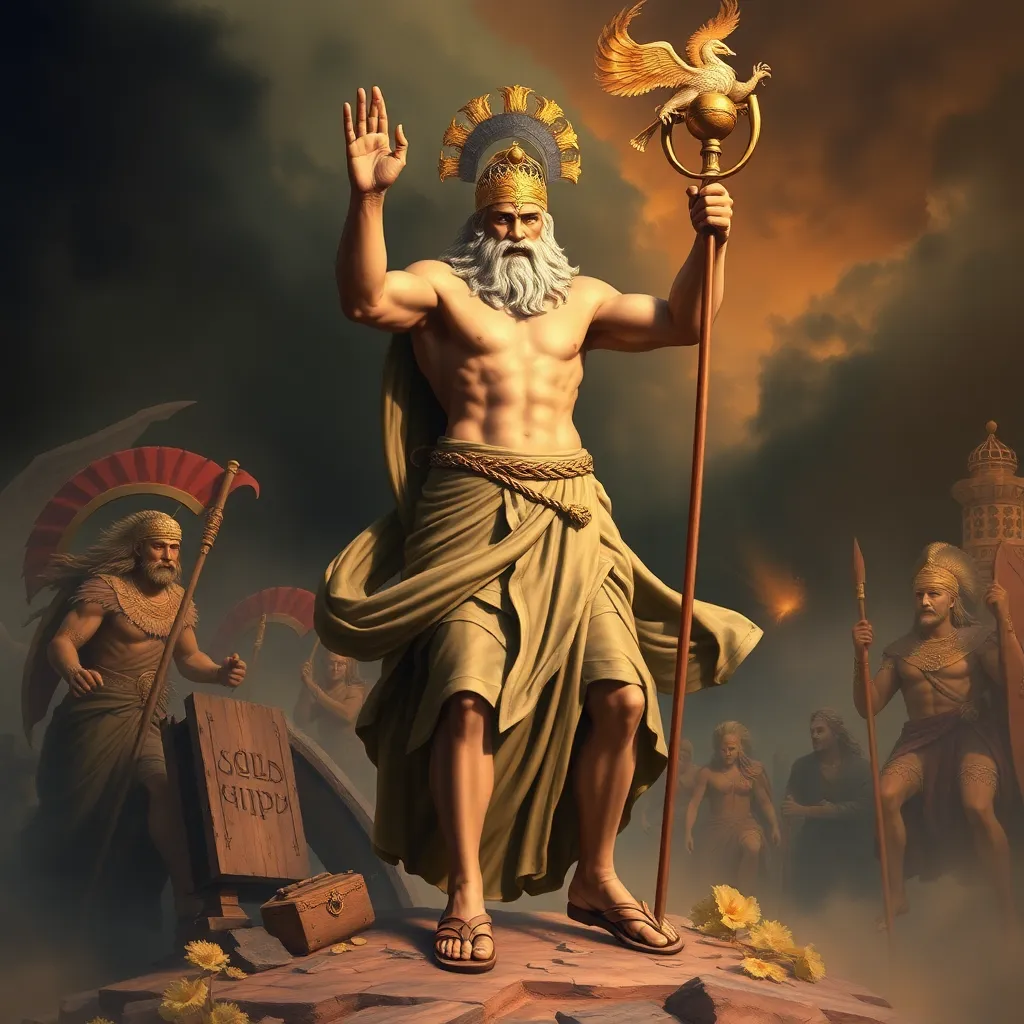The Role of Zeus in the Myths of the Trojan War: A Divine Strategy
I. Introduction
The Trojan War is one of the most significant events in Greek mythology, chronicling the epic conflict between the city of Troy and the Achaeans (Greeks). This legendary war has fascinated scholars and enthusiasts alike for centuries, not only for its narrative of heroism and tragedy but also for the profound impact of divine intervention throughout its course. Central to this divine influence is Zeus, the king of the gods, whose strategies and decisions shaped the events of the war in ways that had lasting repercussions for both gods and mortals.
II. Zeus: The King of the Gods
Zeus is a complex figure in Greek mythology, often depicted as a powerful ruler, wielding thunderbolts and presiding over the pantheon of deities from his throne on Mount Olympus. His character is characterized by both benevolence and wrath, embodying the dual nature of justice and authority.
- Attributes of Zeus: Zeus is often associated with the sky, thunder, and lightning. His role as a father figure extends to both gods and humans, emphasizing his dominion over all.
- Position in the Pantheon: As the chief deity, Zeus holds the highest rank among Greek gods, influencing not only divine affairs but also the lives of mortals.
- Fate vs. Free Will: The intricate relationship between fate and free will is a recurring theme in Greek mythology, with Zeus often seen as the arbiter who balances the two.
III. The Prelude to War: Zeus’s Influence
The seeds of the Trojan War were sown long before the first arrow was loosed. Central to the conflict was the infamous Judgment of Paris, where Paris, a prince of Troy, was asked to choose the fairest goddess among Hera, Athena, and Aphrodite. His choice would have dire consequences.
- The Judgment of Paris: Paris awarded the golden apple to Aphrodite, swayed by her promise of the most beautiful mortal woman, Helen. This act set off a chain reaction that ultimately led to the war.
- Zeus’s Involvement: Although Zeus wished to remain neutral, he could not escape the repercussions of his earlier decisions, such as his role in Paris’s selection as arbiter.
- Divine Prophecies and Omens: Throughout the lead-up to the war, various prophecies and omens hinted at the coming conflict, with Zeus often playing a pivotal role in interpreting or manipulating these signs.
IV. Divine Alliances and Conflicts
The dynamics of the Trojan War were as much about the gods as they were about the mortals. Zeus’s relationships with other deities were crucial in shaping the alliances and enmities that influenced the war’s outcome.
- Zeus’s Relationships: Zeus had complex interactions with other gods, including Hera, who was fiercely supportive of the Greeks, and Aphrodite, who favored the Trojans.
- Impact of Divine Alliances: The allegiances formed between gods and mortals often dictated the course of battles, with divine favor swinging the tides of war.
- Conflict Among Gods: Instances of discord among the gods, such as the quarrel between Hera and Zeus, often led to direct interventions in mortal affairs, complicating the war further.
V. Zeus’s Role During the War
As the war unfolded, Zeus’s involvement became increasingly pronounced, marking key moments that defined the conflict. His interventions were pivotal in maintaining a balance of power among the gods, reflecting his status as the ultimate authority.
- Key Interventions: Zeus’s decisions often determined the outcomes of critical battles, as when he temporarily withdrew his support from the Achaeans, allowing the Trojans to gain the upper hand.
- Balance of Power: Zeus’s ability to influence both sides ensured that no faction could dominate entirely, reinforcing the theme of balance in the myths.
- Shaping Outcomes: Through his direct interventions and strategic decisions, Zeus shaped the war’s trajectory, ultimately influencing which heroes would rise and fall.
VI. The Concept of Justice and Retribution
Zeus is often portrayed as a figure of justice, reflecting the moral framework that governs both divine and mortal actions. His role in the Trojan War underscored this aspect of his character.
- Zeus as a Figure of Justice: Zeus’s judgments were seen as fair but also merciless, teaching mortals the consequences of hubris and wrongdoing.
- Divine Retribution: Throughout the war, there are numerous examples of divine retribution, such as the punishment of Ajax for his disrespect towards Cassandra, which illustrates the consequences of violating divine laws.
- Moral Authority: Zeus’s moral authority influenced human actions, as mortals often sought to appease him through offerings and prayers, hoping to gain favor in their endeavors.
VII. The Aftermath of the War: Zeus’s Legacy
The conclusion of the Trojan War brought about significant consequences for both the gods and mortals, with Zeus playing a crucial role in shaping the post-war landscape.
- Consequences for Gods and Mortals: The war resulted in profound losses, including the fall of Troy and the fates of many heroes, all of which were influenced by Zeus’s earlier decisions.
- Enduring Influence: Zeus’s legacy continued to resonate, as his actions during the war were seen as a reflection of the larger themes of power, justice, and fate in the human experience.
- Mythological Lessons: The myths surrounding Zeus’s involvement in the Trojan War imparted valuable lessons about the nature of conflict, the importance of alliances, and the consequences of divine and human actions.
VIII. Conclusion
In summary, Zeus played a strategic role in the Trojan War, influencing the events and outcomes through his divine interventions and relationships with other gods. The interplay between divinity and humanity in Greek mythology is exemplified by Zeus’s actions and decisions, reflecting the complexities of power and conflict. These myths continue to resonate today, offering insights into the nature of authority, justice, and the eternal struggle between fate and free will.




